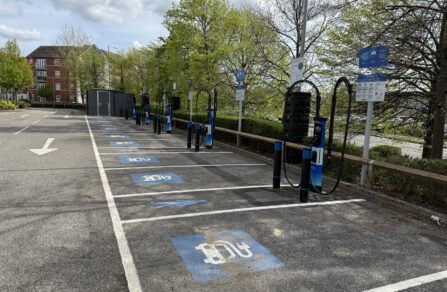
Ask the Experts: How Does Mer Handle the EV Charger Installation Process?
In this series of articles we take the time to sit down with memb...

Electric Vehicles (EVs) might look the same as conventional petrol and diesel motors, but the batteries powering them have brought about a big change in user behaviour. Instead of a quick refill at the local petrol station, charging an EV can still take 230 minutes or so. And sometimesoften much longer with a slower EV charger.
That’s why EV drivers often try to top up with electricity whenever they can to keep their batteries full and mitigate against range-anxiety. Over the last 10-15 years, we’ve seen EV chargers pop up everywhere to take advantage of this new trend. Whether you’re charging your car while you do your weekly shop, visiting the cinema with the kids, or are parked up at work for the day, there are plenty of opportunities.
But what about elsewhere? What if EV charging car parks became commonplace? This blog post explores just those questions, and examines why EV charging parking spaces could be a golden opportunity.
For those running the UK’s 20,000+ public car parks, the popularity of EVs offers a wealth of opportunities for attracting new and repeat customers, for extra revenue generation, and for supporting greener motoring.
So, how can car parking businesses take advantage of this and get ahead of the curve before the 2030 ban on the sale of new petrol and diesel cars and vans comes into force?
The simple answer is, parking operators should be looking now at how they get EV charging stations installed into their premises asap. This can take a variety of forms, from adding simple EV charging parking spaces, to dedicated areas of the car park with high powered chargers, operating like a traditional fuel station would for ICE vehicles.
Charge points can and do attract customers. For EV drivers, and this market share is expected to hit 30% by the time the ban comes in, the opportunity to charge their vehicles while they park is already an important factor in their decision making.
Thinking bigger, dedicated EV charging car parks could be created, where every space has access to a chargepoint for maximum revenue generation.
Coupled with that, EV drivers often rely on specialist maps and booking systems to show the location of charging points, maps that your business can be added to to bring in more customers, and even more if you start doing this before your competition does.
The second opportunity is as an added source of revenue. Charge Point Operators often fully fund the infrastructure and offer a revenue share of the energy consumed by EV drivers as well as bay rent for the dedicated EV bays.

The main fear most businesses have regarding installing EV chargepoints is around the costs and processes involved. However, charging infrastructure companies, like Mer, will manage the planning, installation, management and ongoing maintenance of the chargers, and can help with legal requirements and provide a separate connection if there is not enough power on site.
In many cases, EV charging parking spaces can easily be retrofitted to existing car parks, allowing you to modernise and meet your customers’ needs.
Mer, which is part of European renewable energy giant Statkraft and has vast experience with EV charging installation, starts with a consultation to determine what chargers are needed (ie fast or rapid), how many are needed, in what locations, what existing electrical infrastructure is in place, and what ancillary items (like signage and charging bays) will be required.
From there, we can work with you to figure out what the best funding approach is for your needs, and what grants, subsidies and tax incentives might be available to you.
Follow us on LinkedIn, we will be sharing regular blogs with tips to help businesses transition to electric vehicles.


In this series of articles we take the time to sit down with memb...

Discover the UK government’s 2025 new incentives for EV fleets, i...

The changing face of retail parks is helping them stay relevant f...